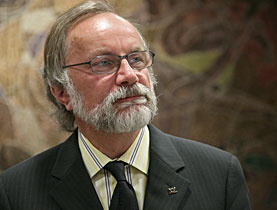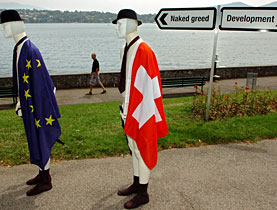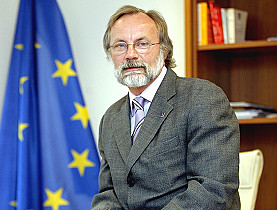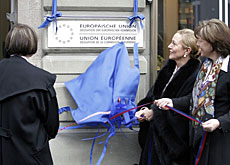“I have confidence in Swiss voters”

Michael Reiterer, the European Union's ambassador to Bern, says his aim is to boost understanding and to smooth relations between the two sides.
After one year in the job, the Austrian – whose official title is European Commission head of delegation to Switzerland – gives swissinfo his views on the ongoing tax dispute and the free movement of people, and outlines what he still wants to achieve.
swissinfo: Could you take off your diplomat’s hat for once and tell us honestly what irritates you about Switzerland?
Michael Reiterer: At the risk of being diplomatic, nothing actually really gets on my nerves. Professionally though it can be hard to get across certain messages about the European Union as people simply don’t want to hear them. The EU is still perceived as only an economic entity. The fact that it has many other aspects is largely ignored.
Besides, Switzerland quite likes to apply very traditional standards: we invented direct democracy, direct democracy doesn’t exist in the EU, therefore the EU is not democratic. Approaching that isn’t easy.
swissinfo: Could the tax scandal currently shaking Germany and Liechtenstein result in the EU scrutinising Switzerland?
M.R.: One has to be more discriminate – you can’t really compare Switzerland’s position with that of Liechtenstein. The EU is currently negotiating an accord on fraud with the principality – something it has already agreed with Switzerland.
What’s more, you can’t just bundle everything up under “tax”. A fact that continues to be difficult to get across is that we are not engaging Switzerland in a debate over tax, but over subsidies. For the EU tax is a national matter – there is no European tax system, rather 27 different ones. Tax competition exists within the EU. The commission’s mandate concerns issues of competition regarding subsidy rights.
swissinfo: Important issues remain over the free movement of people, such as the inclusion of Romania and Bulgaria and extending free movement after 2008. How do you assess the risk that Switzerland could reject these?
M.R.: The free movement of people has been and continues to be in Switzerland’s interest. Everyone who is convinced of that must work to ensure that the issue is not hijacked and used for populist aims. As a result of the free movement of people Switzerland has been able to get the labour force it needed, which has contributed to the economy’s excellent development since 2000.
When the first package of bilateral accords was being negotiated [in 1999 – they came into effect in 2002], the free movement of people was such an important issue that it was agreed that if it was dropped, everything would be dropped. That is not making a threat, but asserting one’s right. Should it come to a referendum in 2009 over the continuation of the free movement of people, I have confidence in Swiss voters.
As for the extension of the accord to Romania and Bulgaria [which both joined the EU in January 2007], it is important to bear in mind that the EU now has 27 members. You cannot treat one state differently from the others. Of course there will be a transitional period – and there we even adopted a Swiss suggestion over our original one – but please: the free movement of people is valid for all 27 members.
swissinfo: You once said that a debate was lacking on the future of Switzerland and the EU. What is your vision?
M.R.: Switzerland must think about that itself. I’m always happy to generate debate on how Switzerland sees its role outside the EU but inside Europe – a lot can be changed, geography however cannot.
A state such as Switzerland, which is justifiably proud of its democratic tradition, can and must ask itself from time to time whether sitting round the negotiating table might actually bring some benefits. The situation should be assessed on a regular basis and without blinkers.
swissinfo: How could such a debate be kick-started?
M.R.: The important thing is to have a broad discussion. No political issue – no matter what – should be relinquished to just one party or group. And those involved in the debate shouldn’t ask themselves “will I become a member tomorrow?”
From a purely economic point of view Switzerland doesn’t need to be a member. This is in stark contrast with other states. Just look at the countries in central and eastern Europe: to be accepted by the EU they have undergone a total transformation within 15 years. None of the old democracies would have been in a position to do that.
swissinfo: What would you like to have achieved as the EU ambassador to Bern when you move on again?
M.R.: Well, I can set Swiss minds at rest and assure you that I will move on…
I would like to see the relationship between Switzerland and the EU become more open and relaxed and discussions to be less emotional. People should also understand that our relationship is also much broader than they might think. So if there is a small problem concerning finance, people shouldn’t jump to conclusions and think that the whole house is burning down.
If this relaxing of relations and better mutual appreciation of roles and values can be achieved, I believe I will have made a small contribution.
swissinfo-interview: Christian Schmid
Switzerland is not a member of the European Union.
The government sees EU membership as a long-term option.
Switzerland is linked to the EU via a series of bilateral accords and the EU is Switzerland’s main trading partner.
In the 1990s debate over Switzerland’s policy towards Europe polarised the national political landscape.
Switzerland has been granting financial aid to countries mainly in eastern Europe to help them transform into market economies.
As part of the second set of bilateral treaties with Brussels, Switzerland pledged to provide SFr1 billion ($0.91 billion) to the ten EU member states which joined the bloc in 2004.
It is also likely to pay about SFr300 million to Bulgaria and Romania.
The 53-year-old Austrian from Innsbruck is the first-ever EU ambassador to Bern.
The “EU embassy” officially opened in the Swiss capital on April 3, 2007.
Reiterer served as deputy head of the delegation of the European Commission to Japan for four years.
Since 2005, as well his diplomatic activities, he has been a lecturer on international relations at Innsbruck University.
Reiterer is the author of two books on relations between Asia and Europe and on asylum law.
He is married and has a daughter.
Switzerland’s competitive tax system has come under scrutiny from the EU, which maintains tax breaks attracting foreign companies contravene the 1972 Free Trade Agreement between Bern and Brussels.
The main bone of contention is that cantons give foreign firms with holding companies based in Switzerland preferential tax privileges by exempting tax on profits generated outside the country. The EU has called on Switzerland to give up the tax practice and adapt to its demands.
Switzerland has so far refused, pointing out that the same tax breaks also apply to many domestic companies and that it has not signed up to the EU’s tax code of conduct. It also says the Free Trade Agreement does not apply to taxation issues.

In compliance with the JTI standards
More: SWI swissinfo.ch certified by the Journalism Trust Initiative



You can find an overview of ongoing debates with our journalists here . Please join us!
If you want to start a conversation about a topic raised in this article or want to report factual errors, email us at english@swissinfo.ch.